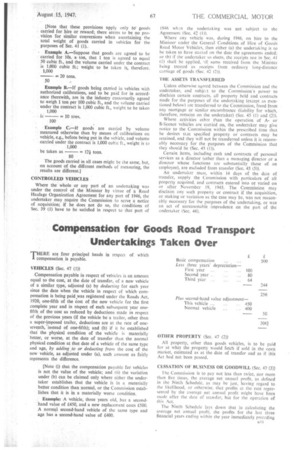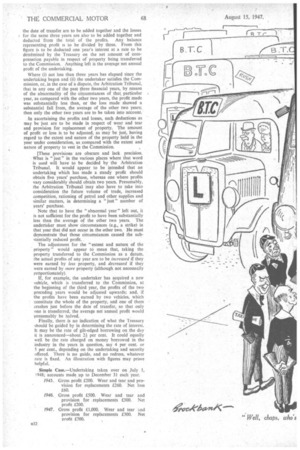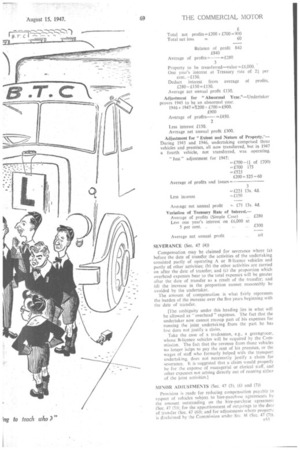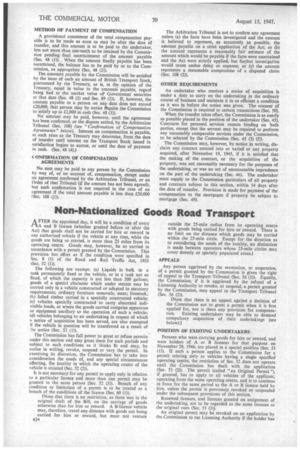Compensation for Goods Road Transport Undertakings Taken Over
Page 41

Page 42

Page 43

Page 44

If you've noticed an error in this article please click here to report it so we can fix it.
THERE are four principal heads in respect of which compensation is payable.
VEHICLES (Sec. 47 (I)) Compensation payable in respect of vehicles is an amount equal to the cost, at the date of transfer, of a new vehicle of a similar type, adjusted (a) by deducting for each year since the date when the vehicle in respect of which compensation is being paid was registered under the Roads Act, 1920, one-fifth of the cost of the new vehicle for the first complete year and in respect of each subsequent year onefifth of the cost as reduced by deductions made in respect of the previous years (if the vehicle bea trailer, other than a super-imposed trailer, deductions are at the rate of oneseventh, instead of one-fifth); and (b) if it be established that the physical condition of the vehicle is materially better, or worse, at the date of transfer than the normal physical condition at that date of a vehicle of the same type and age, by adding to or deducting front the cost of the new vehicle, as Adjusted under (a), such amount as fairly represents the difference.
[Note (i) that the compensation payable for vehicles is not the value of the vehicle; and (ii) the variation under (b) can be claimed only where either the undertaker establishes that the vehicle is in a materially better condition than normal, or the Commission establishes that it is in a materially worse condition.
Example: A vehicle, three years old, has a secondhand value of £450, and a new replacement costs £500. A normal second-hand vehicle of the same type and age has a second-hand value of £400. OTHER PROPERTY (Sec. 47 (2)) All property, other than goods vehicles, is to be paid for at what the property would fetch if sold in the open market, estimated as at the date of transfer and as if this Act had not been passed, CESSATION OF BUSINESS OR GOODWILL (Sec, 47 (3)) The Commission is to pay not less than twice, nor more than five times, the average net annual profit, as defined in the Ninth Schedule, as may he just, having regard to the likelihood, or otherwise, that profits at the rate represented by the average net annual profit might have been made after the date of transfer, but for the operation of this Act.
The Ninth Schedule lays down that in calculating the average net annual profit, the profits for the last three financial years ending within the year immediately preceding Hi I the date of transfer are to be added together and the losses for the same three years are also to be added together and deducted from the total of the profits. Any balance representing profit is to be divided by three. From this figure is to be deducted one year's interest at a rate to be determined by the Treasury on the net amount of compensation payable in respect of property being transferred to the Commission. Anything left is the average net annual profit of the undertaking.
Where (i) not less than three years has elapsed since the undertaking began and (ii) the undertaker satisfies the Commission, or, in the case of a dispute, the Arbitration Tribunal, that in any one of the past three financial years, by reason of the abnormality of the circumstances of that, particular year, as compared with the other two years, the profit made was substantially less than, or the loss made showed a substantial fall from, the average of the other two years; then only the other two years are to be taken into account.
.In ascertaining the profits and losses, such deductions as may be just are to be made in respect of wear and tear and provision for replacement of property. The amount of profit or loss is to be adjusted, as may be just, having regard to the extent and nature of the property held in the year under consideration, as compared with the extent and nature of property to vest in the Commission.
[These provisions are obscure and lack precision. What is " just " in the various places where that word is used will have to be decided by the Arbitration Tribunal. It would appear to be intended that an undertaking which has made a steady profit should obtain five years' purchase, whereas one where profits vary considerably should obtain two years. Presumably, the Arbitration Tribunal may also have to take into consideration the future volume of trade, increased competition, rationing of petrol and other supplies and similar matters, in determining a " just " number of years purchase.
Note that to have the "abnormal year" left 'out, it is not sufficient for the profit to have been substantially
less than the average of the other two years. The undertaker must show circumstances (e.g., a strike) in that year that did not occur in the other two. He must demonstrate that those circumstances caused the substantially reduced profit.
The adjustment for the "extent and nature of the property" would appear to mean that, taking the property transferred to the Commission as a datum, the actual profits of any year are to be increased if they were earned by less property, and decreased if they were earned by more property (although not necessarily proportionately).
if, for example, the undertaker has acquired a new vehicle, which is transferred to the Commission, at
the beginning of the third year, the profits of the two preceding years would be adjusted upwards; and, if the profits have been earned by two vehicles, which constitute the whole of the property, and one of them crashes just before the date of transfer, so that only one is transferred, the average net annual profit would oresumably be halved.
Finally, there .is no indication of what the Treasury should be guided by in determining the rate of interest.
It may be the rate of gilt-edged borrowing on the day it is announced—about 21. per cent. It could equally well be the rate charged on money borrowed in the industry in the years in question, say 4 per cent. or 5 per cent., depending on the undertaking and security offered. There is no guide, and no redress, whatever rate is fixed. An illustration with figures may prove helpful.
Simple Case.--Undertaking taken over on July 1, i948; accounts made up to December 31 each year. 1945. Gross profit £200. Wear and tear and provision for replacements £260. Net loss £60.
1946. Gross profit £500. Wear and tear and provision for replacements £300. Net
• profit £200.
1947, Gross profit £1,000. Wear and tear and provision for replacements £300. Net profit £700.
Total net profits £200 £700=900 Total net loss = 60 Balance of profit 840 £840 Average of profits=—=L280 3 Property to be transferred—value =£6,000.
One year's interest at Treasury rate of 21. per cent. =l50.
Deduct interest from average of profits, £280—£150=f130.
Average net annual profit £130.
Adjustment for "Abnormal Year."--Undertaker proves 1945 to be an abnormal year.
1946 4. 1947 4200 4 £700.-£900.
£901) Average of profits—=£450.
2 Less interest £150, Average net annual profit £300.
Adjustment for "Extent mid Nature of Property."— During 1945 and 1946, undertaking comprised three vehicles and premises, all now transferred, but in 1947 a fourth vehicle, not transferred, was operating.
"Just" adjustment for 1947: =£700—(1 of £700) =-£700 175 =£525 £200 + 525— 60 Average of profits and losses= 3 =n21 13s. 4d.
Less interest =£_1_50 Aveiage net annual profit = £71 13s. 4d.
Variation of Treasury Rate of Interest.— Average of profits (Simple Case) ... 1280 Less one year's interest on £6,000 at
nil
SEVERANCE (Sec. 47 (4))
Compensation may be claimed for severance where (a) before the date of transfer the activities of the undertaking consisted partly of operating A or 13-licence vehicles and partly of other activities; (b) the other activities are carried on after the date of transfer; and (c) the proportion which overhead expenses bear to the total expenses will he greater after the date of transfer as a result of the transfer; and (d) the increase in the proportion cannot reasonably be avoided by the undertaker.
The amount of compensation is what fairly represents the burden of the increase over the five years beginning with the date of transfer.
[The ambiguity under this heading lies in what will be allowed as " overhead " expenses. The fact that the undertaker now cannot recoup part of his expenses for running the joint undertaking from the part he has lost does not justify a claim.
Take the case of a tradesman, e.g.. a greengrocer, whose B-licence vehicles will be acquired by the Commission. The fact that the revenue from those vehicles no longer helps to pay the rent of his premises, or the wages of staff who formerly helped with the transport undertaking. does not necessarily justify a claim for severance, It is suggested that a claim would properly be for the expense of managerial or clerical staff, and other expenses not arising directly out of running either of the joint activities.]
MINOR ADJUSTMENTS (Sec. 47 (5), (6) and (7))
Provision is made for reducing compensation payable in respect of vehicles subject to hire-purchase agreements by the amount outstanding on the hire-purchase agreement (Sec. 47 (5)): for the apportionment of outgoings to the date of transfer (Sec. 47 (6)); and for adjustments where property is disclaimed by the Commission under Sec. 46 (Sec. 47 (7)). METHOD OF PAYMENT OF COMPENSATION A provisional assessment of the total compensation payable is to be made as soon as may be after the date of transfer, and this amount is to be paid to the undertaker, less not more than one-tenth to be retained by the Commission pending final ascertainment of the amount payable (Sec. 48 (1)). When the amount finally payable has been ascertained, the balance has to be paid by or to the Commission, as appropriate (Sec. 48 (2)).
The amounts payable by the Commission will be satisfied by the issue of such an amount of British Transport Stock, guaranteed by the Treasury, as is, in the opinion of the Treasury, equal in value to the amounts payable, regard being had to the market value of Government securities at that date (Sec. 48 (3) and Sec. 89 (2)). If, however, the amount payable to a person on any date does not exceed £20,000, that person may by notice squire the Commission to satisfy up to £2,000 in cash (Sec. 48 (3)).
No amount may be paid, however, until the agreement has been confirmed, or the dispute settled, by the Arbitration Tribunal (Sec. 108) (see "Confirmation of Compensation Agreements" below). Interest on compensation is payable, at such rates as the Treasury may determine, from the date of transfer until interest on the Transport Stock issued in satisfaction begins to accrue, or until the date of payment in cash. (Sec. 48 (4).) CONFIRMATION OF COMPENSATION AGREEMENTS No sum may be paid to any person by the Commission by way of, or on account of, compensation, except under an agreement confirmed by the Arbitration Tribunal, or an Order of that Tribunal (if the amount has not been agreed); but such confirmation is not required in the case of an agreement if the total amount payable is less than £20,000 (Sec. 108 Cl)). The Arbitration Tribunal is not to confirm any agreement unless (a) the facts have been investigated and the amount is believed to represent, as accurately as possible, the amount payable on a strict application of the Act; or (b) the amount represents a reasonably fair estimate of the amount which would be payable if the facts were ascertained and the Act were strictly applied, but further investigation would cause undue delay or expense; or (c) the amount represents a reasonable compromise of a disputed claim (Sec. 108 (2)).
OTHER REQUIREMENTS An undertaker who receives a notice of acquisition is under a duty to carry on the undertaking in the ordinary course of business and maintain it in as efficient a condition as it was in before the notice was given. The consent of the Commission is required to certain transactions (Sec. 50).
When the transfer takes effect, the Commission is as nearly as possible placed in the position of the undertaker (Sec. 45). Contracts for personal services remain binding on both parties, except that the servant may be required to perform any reasonably comparable services under the Commission, to be selected by the Commission (Sec. 45 (3) (f)).
The Commission may, however, by notice in writing, disclaim any contract entered into or varied or any property acquired, after November 19, 1945, if it is satisfied that the making of the contract, or the acquisition of the property, was not reasonably necessary for the purposes of the undertaking, or was an act of unreasonable imprudence on the part of the undertaking (Sec. 46). The undertaker must supply to the Commission particulars of all property and contracts subject to this section, within 14 days after the date of transfer. Provision is made for payment of the compensation to the mortgagee if property be subject to mortgage (Sec. 49).




















































































